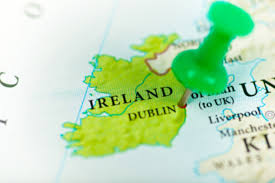by Michael Kern* As a country with one of the lowest corporate tax rates in the world, Ireland has always been a hub for Big Tech. In fact, its so-called Silicon Docks play host to many of the tech industry’s biggest names, including Google, Microsoft, Amazon, Facebook, and many more. The country’s attractiveness to Big Tech, however, has also put it at a crossroads of sorts
As more and more of
the world’s leading tech companies double down on their operations in
Ireland, Dublin is being forced to choose between its climate ambitions
and investment from these giant firms.
In
recent years, tech’s Big Four have begun building massive data centers
on the island nation. And while it’s been great for the country from a
financial standpoint, it is wearing on its energy infrastructure and
sending its carbon footprint to new heights. Though it’s not without
benefits… Between the Big Four,
thousands of jobs have been created and untold amounts of money have
been injected into the Irish economy. And now another up-and-coming tech
star is looking to jump on board.
TikTok
recently announced that it will be investing as much as $500 million to
build its first-ever European data center in Ireland. The data center
should be up and running by 2022 and is predicted to create hundreds of
jobs
"TikTok’s
decision to establish its first European data centre in Ireland,
representing a substantial investment here by the company, is very
welcome,” said IDA Ireland CEO Martin Shanahan,
adding that "Following on from the establishment of its EMEA Trust
& Safety Hub in Dublin earlier in the year, [it] positions Ireland
as an important location in the company’s global operations.”
Related: Ammonia: A Jet Fuel For The Future
But what will yet another massive data center mean for the country’s clean energy plans?
According to a report by an Irish grid operator, EirGrid, some of these giant data centers
can use as much energy as entire towns. The report goes on to mention
that data centers alone could account for nearly 30 percent of all of
Ireland’s energy consumption by 2028.
And
to make matters worse, some data center operators are relying on
on-site gas plants, burning fossil fuels, due to shortages of capacity
in the local electrical grid.
This
conundrum is not without its own light at the end of the tunnel,
however. The data center boom in Ireland has driven demand -and
investment - for greener solutions.
Facebook, Microsoft, Amazon and Google have all made lofty emissions
commitments, putting big red targets on their backs. Microsoft, for
example, has pledged to go carbon-neutral within the next ten years. And
the other giants have made similar claims. This means the clock is
ticking to build - or buy - the infrastructure needed to keep their data
centers green.
Amazon
and Facebook are leading this push in Ireland, signing high-profile
agreements for the construction of major renewable projects in the
country to power their data centers.
Amazon, for its part, is on track to double its renewable capacity in Ireland with a new deal to build a 115-megawatt wind farm in
Ardderroo, Co Galway. This new project will join its Esk, Co Cork wind
farm, which is set to begin operations next month, and Meenbog, Co
Donegal project, which will come online in early 2022.
Not to be outdone, Facebook has also just secured a new deal with Brookfield Renewable Partners to build and buy power from a wind
farm in Tipperary. This agreement is in addition to Facebooks growing
number of renewable power purchases, which total 805-megawatts around
the world, but primarily in the United States.
Considering
how much energy Big Tech uses in Ireland, these arrangements will play a
key role in the country’s renewable energy growth. It’s already happening in Taiwan, after all.




